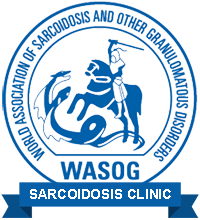Benefits of physical training in patients with idiopathic or end-stage sarcoidosis-related pulmonary fibrosis: a pilot study
Keywords:
exercise limitation, physical training, rehabilitation, pulmonary fibrosis, IPF, sarcoidosisAbstract
Background: The natural history of disease in patients with stage IV (fibrotic) sarcoidosis may mirror that of patients with idiopathic pulmonary fibrosis (IPF). Both are bothered by progressive dyspnea, exercise limitation and fatigue. Objective: To establish whether patients suffering from pulmonary fibrosis might benefit from a physical training program. Study design: Twenty-four eligible patients referred to the out-patient clinic of the ild care expertise team of Hospital Gelderse Vallei, Ede, The Netherlands between November 2012 and November 2013 were included in this observational pilot study of a 12-week physical training program. Outcomes, including exercise capacity, skeletal muscle strength, lung function and fatigue were assessed at two time points: 1) baseline; and 2) after completion of a 12-week physical training program. Results: At baseline, the percentage predicted DLCO, FVC, FEV1 and exercise capacity (assessed by six-minute walking distance (6MWD) or maximal oxygen uptake) was reduced in both groups. After program completion, exercise capacity improved (>10% improvement 6MWD) in 13 subjects (54.2%): 7 with IPF and 6 with sarcoidosis subjects. Other secondary endpoints, including pulmonary function tests and patient-reported outcome measures improved in some subjects. Conclusion: A 12-week physical training program improved or maintained exercise capacity in patients with IPF (despite disease progression) or fibrotic sarcoidosis. The results from this pilot study could be used to design prospective studies aimed at answering lingering questions about exercise training in patients with these progressive, incurable conditions.Downloads
Published
Issue
Section
License
This is an Open Access article distributed under the terms of the Creative Commons Attribution License (https://creativecommons.org/licenses/by-nc/4.0) which permits unrestricted use, distribution, and reproduction in any medium, provided the original work is properly cited.
Transfer of Copyright and Permission to Reproduce Parts of Published Papers.
Authors retain the copyright for their published work. No formal permission will be required to reproduce parts (tables or illustrations) of published papers, provided the source is quoted appropriately and reproduction has no commercial intent. Reproductions with commercial intent will require written permission and payment of royalties.

This work is licensed under a Creative Commons Attribution-NonCommercial 4.0 International License.




